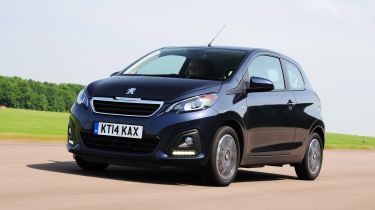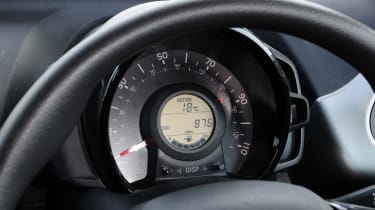Peugeot 108 (2014-2022) review - MPG, CO2 and Running Costs
When cars are this cheap and efficient, does it matter if they're not class leaders in every respect?

Whether you choose the 1.0 manual or auto, Active Stop & Start is included to help deliver reduced CO2 emissions. However, the 108 isn't quite as efficient as it used to be, but that's because of the new WLTP testing procedure. While the most efficient 108 had an emissions figure of 88g/km and official fuel economy of 74.3mpg, it's not quite as efficient now.
The standard 1.0-litre 108 records emissions of 93g/km with the five-speed manual gearbox and 95g/km with the automated manual transmission, while claimed fuel consumption figures stand at 57.3mpg and 55mpg respectively.
By way of reference, the more powerful 1.2-litre engine claims 99g/km emissions and 65.7mpg fuel economy, but those figures are recorded under the old NEDC test procedure, so aren't comparable with the WLTP figures.
There’s also no emissions or economy penalty for choosing the five-door 108 over the three-door, as the vehicle weights are so similar as to make no noticeable difference.
If you want to run the 108 as a company car, the low CO2 emissions will help matters; the fact that all models are petrol-powered saves on the three per cent diesel surcharge, too.
Insurance
With such limited performance on offer, it’s no surprise that insuring the 108 is a relatively painless business. The range starts at group six for the 1.0-litre three-door Access and rises to group 11 if you source an older 1.2 litre. Insurance groups are identical for the Citroen C1, although the Toyota Aygo doesn’t make it above group seven.
If you really hate paying insurance premiums, consider that the near-identical Volkswagen up!, Skoda Citigo and SEAT Mii line-ups, as well as the Hyundai i10 range, start at an impossible-to-beat group one and only rise as far as group four – although the more powerful versions don’t offer sprightly performance to match their French rivals.
Depreciation
City cars aren’t quite the gold-plated depreciation bet of a few years back due to increasing sales and competition in the sector, but the Peugeot 108 doesn’t fare badly. With anticipated three-year residual values of around 47 per cent for the entry-level Access, and the low entry price when new, you shouldn’t be hit too hard in the wallet come resale time. More expensive versions don’t perform quite so well: our experts suggest a top-of-the-range 108 Feline will retain only 44 per cent of its new price over three years.







